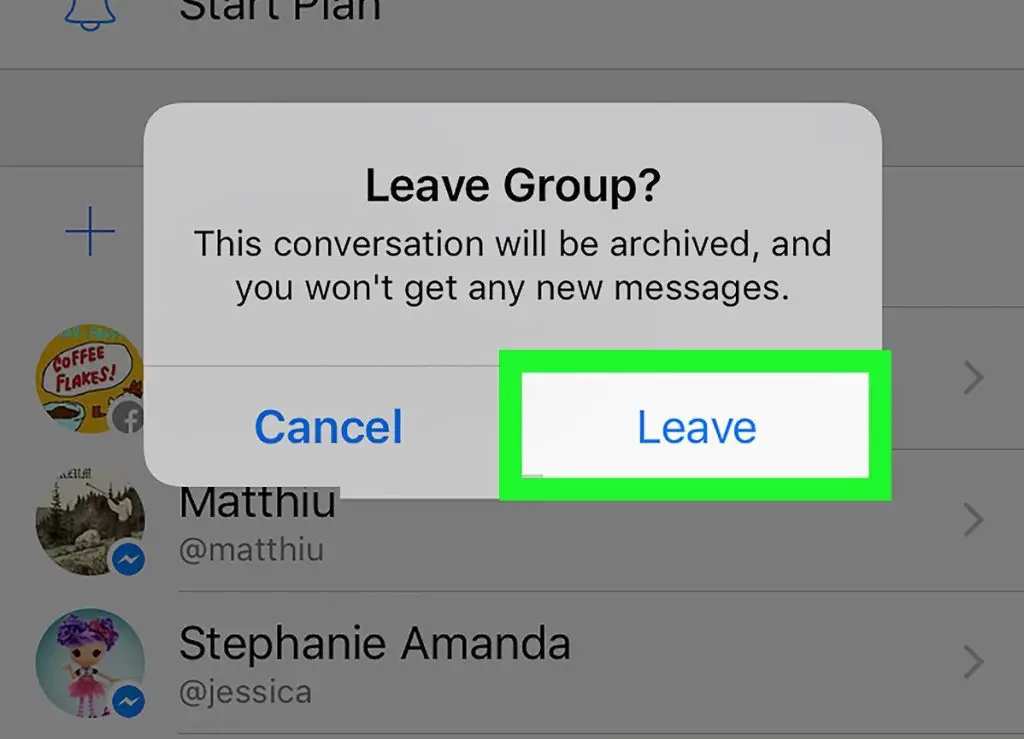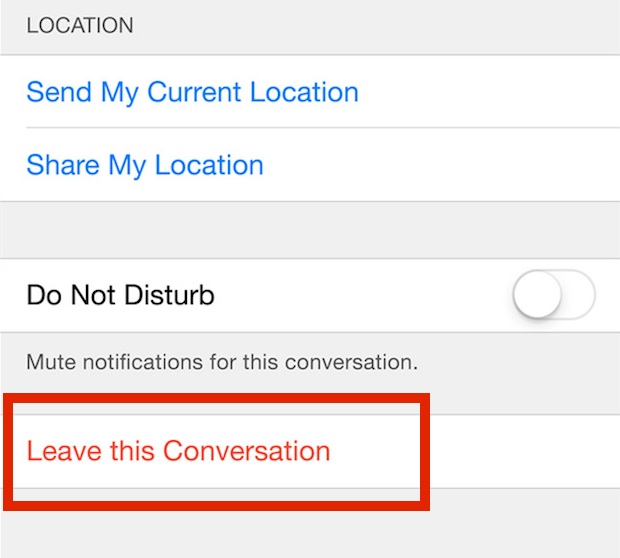In the digital era, where group chats have become a central hub for communication, deciding to leave one can be a complex decision. It’s a common dilemma – is leaving a group chat rude? As an expert in digital etiquette and communications, I’ve delved into this topic to provide you with comprehensive insights. In this blog post, we’ll explore the various dimensions of this question together. So whether you’re contemplating an exit from your office WhatsApp group or your college friends’ Discord server, rest assured, you’ve come to the right place.
Whether leaving a group chat is considered rude largely depends on the specific context and personal perceptions of the members involved. It’s not universally seen as rude, but in some instances, it can be perceived as such.
But what if you’re the one wanting to leave a group chat? Stick around as we delve into the unspoken rules of digital communication and unravel whether it’s truly impolite to hit that ‘exit’ button.

Unraveling the Complexities of Group Chat Departure
The above paragraph provides a brief insight into whether leaving a group chat is considered rude. However, like most social etiquette rules, this isn’t a straightforward yes or no question. The perception of rudeness in such instances varies considerably based on numerous factors. This subheading aims to delve deeper into these complexities and provide a more comprehensive understanding.
- Contextual Factors: The context of the group chat plays an essential role in determining if your departure will be seen as rude. For example, leaving a work-related group chat without any prior notice might come off as unprofessional and disrespectful, while exiting from an informal friend’s group could be less controversial.
- Group Size: The size of the group also matters. Leaving a smaller, intimate group chat where everyone’s participation is noticed can seem ruder than leaving a larger one where individual participation may not be as significant.
- Communication Prior to Leaving: How you communicate your decision to leave significantly impacts how your action is perceived. Abruptly leaving without any explanation can appear rude, while providing valid reasons for your exit in advance can help mitigate negative perceptions.
- Relationship with Group Members: Your relationship with other members in the group chat influences their perception of your departure. Leaving a family or close friends’ group chat can potentially hurt feelings more than departing from an acquaintance or professional group.
- Cultural Factors: Different cultures have different norms for digital communication etiquette, so what might be seen as rude in one culture may not necessarily be viewed the same way in another.
- Platform Specific Norms: Different social networking platforms have their own set of unspoken rules and expectations about behavior within their respective communities which includes exiting from groups.
- Nature of Group Chat: If the group was created for a temporary purpose (like planning an event), it would generally not be considered rude to leave once that purpose has been fulfilled.
While these points provide some general guidelines, remember that each situation is unique and requires careful consideration before making such decisions.
Understanding Group Chat Etiquette
Understanding the nuances of group chat etiquette is essential, especially in today’s digitally driven world. The concept of rudeness in a digital context, particularly when leaving a group chat, may seem trivial to some but can be a significant concern for others. But is the sentiment of leaving being seen as rude universal? The answer isn’t quite straightforward.
The perception of rudeness varies widely across different cultures, societies, and individuals. What might be considered impolite or disrespectful in one culture may not hold the same connotation in another. For instance, while Western cultures may view abruptly exiting a group chat without prior notice as rude due to their emphasis on open communication and directness, Eastern cultures might perceive it differently.
In countries like Japan or South Korea, where indirect communication is often preferred to maintain harmony and avoid confrontation, leaving a group chat without an explanation might not necessarily be seen as rude. Instead, it could be interpreted as an attempt to avoid conflict or discomfort within the group.
Moreover, individual personality traits also play a crucial role in determining whether leaving a group chat is perceived as rude or not. For example, introverts who value personal space and quiet time more than extroverts might not see an issue with someone leaving a group chat. They understand the need for personal boundaries and respect them.
On the other hand, extroverted individuals who thrive on social interaction may view this act negatively due to their inclination towards maintaining active participation within social groups.
The age demographic involved also influences this perception significantly. Younger generations who have grown up with technology at their fingertips are generally more lenient about digital etiquette compared to older generations who value traditional norms of communication.
In essence, while there’s no universal consensus on whether leaving a group chat is considered rude or not – cultural norms, individual personalities and generational differences all contribute to shaping this perception.
Thus understanding these factors helps us navigate our way through the complex labyrinth of digital etiquette without unintentionally offending anyone – because at the end of the day that’s what we all want – harmonious interactions that respect individual boundaries while maintaining healthy relationships.
What Constitutes Rudeness In A Digital Interaction
In the evolving landscape of digital communication, understanding what constitutes rudeness is essential. Rudeness in digital interactions encompasses a wide array of behaviors and actions that are considered disrespectful, impolite, or inappropriate. Here’s an overview:
- Ignoring Messages: One of the most common forms of perceived rudeness in a digital setting is ignoring messages. When someone sends a message and receives no response, it can feel like a direct snub.
- Ghosting: This term refers to suddenly cutting off all communication without any explanation. It’s akin to disappearing from someone’s life without a trace—an act often seen as extremely rude.
- Short Responses: Replying with one-word answers or using curt language can be interpreted as dismissive or uninterested behavior, which is generally seen as impolite.
- Interrupting Conversations: In group chats especially, interrupting ongoing conversations with unrelated topics can be viewed as disrespectful.
- Overuse of Capitals and Exclamation Marks: Typing in all caps or using excessive exclamation marks can come across as shouting or being overly aggressive—both considered rude behaviors online.
- Trolling or Cyberbullying: Deliberately posting provocative messages with the intent to upset others, or engaging in harassment and bullying activities online, is not just rude—it’s harmful and potentially illegal.
- Spamming: Repeatedly sending unsolicited messages or overloading a chat with irrelevant content is another form of digital rudeness.
- Sending Inappropriate Content: Sharing offensive jokes, explicit content, or sensitive information without consent crosses the line into rudeness territory.
- Invading Privacy: Snooping into personal chats or spreading private information publicly is highly disrespectful and intrusive behavior.
- Leaving Without Notice: And finally, abruptly leaving a group chat without any prior notice may be perceived as rude by some members who might feel disrespected by your sudden exit.
Remember that these are broad guidelines; what may seem rude to one person might not be for another due to differences in cultural norms, personal boundaries, and communication styles. However, maintaining respect for these general rules will help foster more positive digital interactions.
It’s also worth noting that context matters significantly when determining whether an action is rude or not—what might be acceptable among close friends could be deemed entirely inappropriate in professional settings.
Understanding what constitutes rudeness in digital interaction helps us navigate our online relationships more effectively while promoting healthier communication environments where everyone feels respected and heard.

The Psychology Behind Perceiving Leaving A Group Chat As A Rude Behavior
The psychology behind perceiving leaving a group chat as a rude behavior is deeply rooted in our inherent need for social belonging and acceptance. In essence, humans are social creatures who thrive on interpersonal connections and interactions. When someone leaves a group chat, it can feel like a rejection of the social contract that binds the group together.
There are several psychological theories and concepts that can help us understand this phenomenon better:
- Social Identity Theory: This theory posits that individuals derive their identity from the groups they belong to. Hence, when a member leaves, it disrupts the collective identity of the group, which can be perceived as an act of rudeness or betrayal.
- Belongingness Hypothesis: According to psychologist Roy Baumeister, human beings have an innate desire to belong and be an integral part of groups. Therefore, when someone exits a group chat, it might trigger feelings of exclusion or abandonment among remaining members.
- Fear of Missing Out (FOMO): This modern-day phenomenon explains why people may perceive leaving a group chat as rude. The person exiting is essentially choosing to miss out on future exchanges and interactions, which could be seen as rejecting the value offered by the group.
- Uncertainty Reduction Theory: This theory suggests that people seek information to reduce uncertainty about others’ behaviors and intentions. When someone leaves without explanation, it creates uncertainty about their reasons for leaving and might be interpreted as rudeness.
- Politeness Theory: According to this theory by sociolinguists Penelope Brown and Stephen Levinson, people use politeness strategies to mitigate face-threatening acts (FTAs). Leaving a group chat might be seen as an FTA if not done politely because it threatens the positive face wants (desire to be liked) of other members.
- Online Disinhibition Effect: This concept describes how people behave more freely online due to anonymity or invisibility factors. In this context, some may leave chats without considering others’ feelings because digital platforms provide a degree of detachment from real-world consequences.
Understanding these psychological perspectives helps clarify why some view leaving a group chat as rude behavior. It’s not simply about exiting a virtual conversation; it’s about disrupting social dynamics and triggering complex emotional responses in others.
However, this isn’t universal – perceptions vary widely based on other factors discussed below.
Factors affecting Rudeness Perception
1. Personal And Cultural Factors
There are several personal and cultural factors that can influence why some people find leaving a group chat rude. Let’s delve into these aspects to gain a better understanding of this perception.
Firstly, on the personal front, one’s past experiences greatly shape their perspective on digital interactions. If an individual has previously experienced abandonment or rejection in their life, they may perceive someone leaving a group chat as a similar act of desertion. This could make them feel overlooked or unwanted, leading to the sentiment that the act is rude.
Secondly, personality traits play a significant role in how one perceives digital etiquette. For instance, individuals with high empathy levels may view leaving a group chat as an insensitive act as they can imagine how it might feel for others left in the conversation. On the other hand, those who value direct communication might see it as disrespectful because it lacks a clear explanation or farewell.
Thirdly, consider attachment styles. People with secure attachment styles tend to be less affected by others’ online actions since their self-worth isn’t heavily tied to digital interactions. However, those with anxious or avoidant attachment styles might take someone exiting a group chat more personally and view it as impolite.
Now let’s pivot towards cultural factors influencing perceptions of rudeness when leaving a group chat. Cultural norms around communication vary widely across different societies and communities. In some cultures where indirect communication is valued over direct confrontation (like many East Asian cultures), abruptly leaving a group chat without prior notice or explanation might be seen as incredibly impolite.
In contrast, cultures that prioritize individualism over collectivism (like many Western cultures) may have more tolerance for such actions since personal boundaries are respected above communal harmony. However, even within these societies, there can be subcultures (for example among certain age groups or professional circles) where leaving a group chat is considered discourteous.
Another cultural aspect is the significance attributed to virtual social spaces like group chats within different communities. In cultures where online interactions are deemed just as important as face-to-face ones (such as among many younger demographics), exiting a group chat could be likened to walking out of a physical gathering without saying goodbye – clearly viewed as rude by most standards.
2. Different Social Networks

In understanding how rudeness perception varies across different social networks’ group chats, it’s crucial to consider the unique features and user demographics of each platform.
WhatsApp, for instance, is an intimate communication tool often used by close-knit groups such as friends or family. Here, leaving a group chat without explanation may be perceived as rude due to the personal relationships involved. A sudden exit can elicit feelings of rejection or abandonment among remaining members, especially if the group was created for a specific purpose or event.
On Facebook, group chats are often larger and more diverse in nature. They may include community groups, hobby clubs, or professional networks. Given this diversity, reactions to someone leaving a group chat can vary widely. Some members might not even notice an individual’s departure given the size of the group while others might interpret it as a statement against the community or its values.
Discord is another beast altogether. Primarily used by gamers and hobbyist communities, Discord’s server-based structure allows for multiple channels within a single group. This means that leaving one channel doesn’t necessarily mean exiting the entire server – reducing any potential rudeness sentiment associated with leaving a conversation.
However, Discord also has private messaging features similar to WhatsApp and Facebook Messenger where leaving could be seen as rude depending on the context and relationship between users.
On professional platforms like Slack or Microsoft Teams may have different etiquette rules compared to casual social media apps like WhatsApp or Facebook Messenger. Leaving a professional chat without informing others might be seen as unprofessional conduct while doing so on a casual platform might not carry the same stigma.
It’s crucial to note that these perceptions aren’t set in stone but are influenced by several factors including cultural norms, personal expectations about digital communication etiquette, and prior experiences within online communities.
Ultimately though, it’s vital to understand that every social network has its own unspoken rules and etiquette which can influence how actions like leaving a group chat are perceived. Being aware of these nuances can help mitigate misunderstandings and maintain positive online relationships across various platforms.
3. Time Sensitivity
In the realm of digital communication, time sensitivity plays a pivotal role in determining whether leaving a group chat can be perceived as rude or not. While there isn’t a universally accepted ‘right’ time to leave a group chat, certain circumstances may make your departure less likely to be viewed negatively.
One such instance is when the group chat has served its purpose. For example, if you were part of a temporary project team at work and the project has been successfully completed, leaving the group chat afterwards would hardly be seen as rude. It’s an understood and expected action once the shared objective has been met. The same applies to event-specific chats; once the birthday party or wedding planning is over, it’s quite acceptable for members to exit without causing any offense.
Another situation where leaving might not be considered impolite is late at night or very early in the morning. During these hours, most people are less likely to notice your departure immediately, giving them time to process it before reacting. This might soften any potential negative reactions.
It’s also worth considering the frequency and recency of your interactions within the chat. If you’ve been mostly inactive for a considerable period, your departure might not even be noticed by many members. In this case, leaving won’t necessarily come across as rude since your presence wasn’t significantly contributing to ongoing discussions.
However, if you’re an active participant who suddenly leaves during an intense conversation or heated debate without any prior indication or explanation, this could indeed be perceived as abrupt and potentially disrespectful. The timing here is crucial; departing in the middle of an unresolved issue could leave other participants feeling abandoned or slighted.
In contrast, if there’s been a lull in conversation for some time – say several days or weeks with minimal interaction – exiting then may seem less abrupt and thus less likely to offend anyone.
Finally, consider how long you’ve been part of the group chat. If you’ve just joined recently and decide to leave soon after without much participation, this could appear dismissive towards other members who welcomed you into their space. On the flip side, if you’ve been part of a long-standing group for years and have built deep connections with its members over time, leaving abruptly without explanation could indeed feel like a betrayal.
4. Public Versus Private Group Chats

In the realm of digital interactions, public and private group chats often carry different connotations and expectations, which can significantly influence the perception of rudeness when a member decides to leave.
Public group chats are typically larger in size and more diverse in their participant makeup. Often created for specific purposes such as discussing shared interests or disseminating information, these groups tend to have a more transient membership. As a result, people entering and exiting these chats is generally considered part of the norm. Therefore, leaving a public group chat is less likely to be perceived as rude due to its inherent fluidity.
On the other hand, private group chats are usually smaller and consist of close-knit circles like friends, family members or colleagues. The dynamics in these groups are much more personal and intimate; thus any action taken within these chats carries more weight. Leaving a private chat may come off as abrupt or even offensive, especially if it’s done without prior notice or explanation.
The context also plays a significant role in shaping the perception of rudeness in both types of group chats. In public forums where discussions can become heated over controversial topics or disagreements, leaving might be viewed as an act of disengagement or avoidance rather than rudeness. However, abruptly leaving during an ongoing conversation in a private chat could be interpreted as dismissive or disrespectful.
To navigate these complexities successfully, it’s crucial to understand the nuances associated with each type of group chat. When considering leaving a chat, think about its nature (public vs private), the relationships you have with other members, and the potential implications your departure might have on those relationships.
Remember that communication is key: if you feel uncomfortable or find it necessary to leave for any reason – be it due to overwhelming notifications or irrelevant content – expressing your reasons before exiting can help mitigate any potential negative perceptions. This way you respect the dynamics of both public and private group chats while maintaining positive relationships with their members.
Ways To Communicate Before Leaving A Group Chat
Overcoming the sentiment of rudeness when leaving a group chat largely hinges on effective communication. It’s about setting clear expectations and showing respect for the other members’ feelings. Here are some strategies that can help you navigate this process:
- Announce Your Departure: Instead of abruptly leaving, make sure to inform everyone in the group that you’ll be departing soon. This gives them time to adjust and also provides an opportunity for any final exchanges.
- Explain Your Reasons: People are more likely to understand your decision if they know why you’re making it. Whether it’s because you’re overwhelmed with notifications or simply no longer feel connected to the group’s purpose, sharing your reasons can help others empathize with your situation.
- Express Gratitude: A simple thank you goes a long way in softening the blow of your departure. Thank everyone for their contributions and acknowledge any positive experiences or learning opportunities the group chat has provided.
- Offer Alternative Means of Communication: If there are individuals within the group with whom you want to maintain contact, provide alternative ways they can reach out to you – like email, direct messages, or another social media platform.
- Choose a Suitable Time: Timing is crucial when leaving a group chat. Avoid exiting during heated discussions or critical decision-making periods as this could be seen as abandoning the team when they need you most.
- Keep it Short and Sweet: While it’s important to explain yourself, avoid overly lengthy explanations which might come across as insincere or dramatic.
- Use Polite Language: The tone of your exit message plays a significant role in how it’s perceived by others. Make sure your language is respectful and considerate throughout.
Remember, every situation is unique and will require its own approach based on factors like the nature of relationships within the group, cultural nuances, and individual personalities involved. However, these general tips should serve as a helpful guide in mitigating any potential rudeness associated with leaving a group chat.
Lastly, don’t forget that while being mindful of others’ feelings is important, ultimately it’s okay to prioritize your mental health and personal boundaries over staying in digital spaces where you no longer feel comfortable or productive.
Responses To Leaving A Group Chat
Responses to someone leaving a group chat can vary greatly, and these reactions often serve as indicators of whether the action was perceived as rude or not. To better understand this, let’s break down some common responses and what they might mean:
- Silence: If no one comments on your departure, it could mean a few things. Perhaps members didn’t notice you left, especially in larger groups where activity is high. Alternatively, it could mean that your exit wasn’t seen as significant or rude – merely a personal choice. However, silence can also indicate discomfort or disapproval among group members.
- Direct Acknowledgment: This is when someone openly acknowledges your departure with statements like “I see you’ve left the group” or “You’re leaving us?”. This response usually indicates surprise and potentially disappointment but doesn’t necessarily label the act as rude.
- Questioning Your Reasons: If people start asking why you left the group chat, it may suggest they are trying to understand your motivation rather than immediately labeling the act as rude. It shows concern and curiosity about your decision.
- Negative Comments or Criticism: When members react with negative comments such as “That was uncalled for,” or “Couldn’t handle us anymore?”, it’s a strong indicator that they perceive your exit as rude or abrupt.
- Jokes or Teasing: Some may mask their feelings with humor by making light-hearted remarks about your departure. While this response seems casual, it might indicate underlying feelings of confusion, surprise, or even slight offense.
- Positive Reinforcement: Reactions like “Best of luck!” or “We’ll miss you” show understanding and acceptance of your decision to leave the group chat without any hard feelings attached.
Remember that these interpretations aren’t definitive; context matters significantly in digital communication.
Finally, don’t forget that text-based communication lacks non-verbal cues such as tone of voice and facial expressions which often leads to misinterpretation of intent behind words used online.
Is Leaving A Group Chat More Rude In Professional Settings?
Professional settings typically have an unspoken code of conduct that governs interactions and behaviors. In a professional group chat, such as those formed for project collaborations or departmental discussions, leaving abruptly may be seen as disrespectful or dismissive. This perception stems from the expectation of commitment and collaboration in these environments. When you leave a professional group chat without prior notice or valid reason, it could be interpreted as you shirking your responsibilities or not valuing the input and time of others.
In contrast, casual chats are often more forgiving when it comes to exiting the conversation. These chats are usually created for social purposes like planning outings, sharing interests, or simply catching up with friends. Here, there’s an understanding that participation is voluntary and based on personal interest and availability. Leaving such a group chat might still raise eyebrows but is less likely to be considered outright rude unless it’s done repeatedly without explanation.
However, even within these broad categories of ‘professional’ and ‘casual’, there are nuances to consider. For instance, if you’re part of a small team working on a crucial project at work and decide to exit the project’s group chat without any communication, this action could be perceived as far more rude than leaving a large department-wide informational chat.
Similarly, leaving a close-knit friend circle’s chat abruptly might seem ruder than exiting from a larger casual group comprising distant acquaintances or hobby enthusiasts.
The key difference lies in expectations: Professional settings generally demand higher levels of accountability and commitment compared to casual ones where participation is often discretionary.
That said, regardless of whether it’s professional or casual setting, communicating your intention to leave beforehand can go a long way in mitigating any negative feelings associated with your departure. A simple message explaining your reasons for leaving can help maintain relationships outside the chat and ensure that your exit isn’t misconstrued as rudeness. Open communication remains key in both scenarios to mitigate potential misunderstandings.

Effect On Your Relationship With The Group Members Outside The Chat?
Leaving a group chat can have significant effects on your relationships with the other members outside of the chat, depending on various factors such as the nature of the group, your relationship with its members, and how you choose to exit.
Firstly, if you’re part of a group that’s primarily professional or formal in nature—say, a workplace team or an academic study group—your departure might be interpreted as lack of interest or commitment towards shared objectives. This could potentially harm your professional reputation and strain your relationships with colleagues or peers. It’s crucial to communicate clearly about your reasons for leaving in such scenarios, ideally before making the move.
In contrast, if the group is more informal or social—like a friend circle or hobby club—the impact might be different. Here, leaving without notice could be seen as distancing yourself from the group socially. Friends may feel slighted or rejected, which could lead to misunderstandings and friction in your personal relationships.
The manner in which you leave also plays a role in shaping perceptions. Abrupt exits with no explanation are often viewed negatively and can breed resentment among remaining members. On the other hand, if you provide an explanation and express gratitude for shared experiences before leaving, it can help maintain goodwill and mutual respect.
Moreover, it’s worth considering how active you’ve been within the chat. If you rarely participate and mostly lurk in the background, your departure might not make much of an impact at all. But if you’re a key participant whose presence significantly contributes to the dynamic of the chat, then your absence might be felt more strongly.
The size of the group can also influence reactions to your departure. In larger groups where interactions are less personal and intimate, one member leaving might not cause much disruption. But in smaller groups where each member plays a significant role in maintaining interaction levels and overall morale, one person’s exit could create a noticeable void.
Lastly but importantly: remember that every action online—including exiting a group chat—leaves a digital footprint that contributes to people’s perception of us both online and offline. Hence it’s crucial to navigate these virtual spaces thoughtfully so that our digital behaviour aligns with who we want to be perceived as ‘in real life’.
Curating A Respectful Exit Message
Crafting a respectful exit message is an art that can significantly reduce the perception of rudeness when you decide to leave a group chat. It’s about striking a balance between honesty, kindness, and consideration for others’ feelings. Here are some tips on how to curate your exit message:
- Be Honest but Tactful: Honesty is always appreciated, but it doesn’t mean being brutally truthful. If the group chat is too noisy or irrelevant for you, express this in a way that doesn’t offend others. For instance, instead of saying “This group chat is annoying,” consider saying something like “I’m finding it hard to keep up with all my messages.”
- Show Gratitude: Always thank the members for their time and contribution. This gesture shows respect and appreciation for their presence and involvement in the group chat.
- Provide a Reason (if comfortable): People generally understand when you have legitimate reasons such as work overload, personal issues, or other commitments that prevent you from participating actively in the group chat.
- Use Polite Language: The tone of your message matters just as much as its content. Ensure your language is polite and respectful to avoid any misunderstanding or negative sentiment.
- Avoid Blaming Others: If conflicts within the group chat are causing your departure, avoid blaming specific individuals in your exit message – it will only stir up more drama.
- Offer Alternative Ways to Stay Connected: If you’re leaving because of too many notifications or lack of interest in the shared topic, suggest alternative ways to stay connected with the members who matter to you.
Here are some examples of respectful exit messages:
- “Hey everyone! I’ve had a great time interacting with all of you here but due to my increasing workload, I find it challenging to keep up with all chats simultaneously. Please feel free to reach out directly if there’s anything important! Thanks for understanding.”
- “Hello all! It’s been wonderful being part of this vibrant community but unfortunately due to personal reasons I need to streamline my digital interactions. I appreciate all your contributions and look forward to catching up individually when possible.”
Remember that every situation is unique so tailor these guidelines according to your circumstances and relationships within the group chat. The key factor here isn’t merely exiting without seeming rude; it’s about maintaining respect and goodwill even as you make your departure.
Alternatives To Leaving A Group Chat
Exploring alternatives to leaving a group chat is an interesting aspect of this discourse. You might be wondering if there are less abrasive ways to disconnect from a chat without causing offense. Let’s delve into some possibilities:
- Muting Notifications: One of the simplest alternatives is to mute notifications for a particular group chat. This way, you won’t be disturbed by constant message alerts, but you’ll still technically remain part of the group. However, this could still be considered rude if your participation was expected and it becomes apparent that you’ve been ignoring the chat.
- Setting Statuses or Auto-Replies: Some platforms allow you to set statuses or automated replies that can indicate your unavailability or limited interaction. This method communicates your intention without requiring explicit departure. Yet again, not everyone may appreciate this approach as it could be perceived as impersonal or dismissive.
- Personal Communication: If the group size is manageable, reaching out individually to explain your reasons for reduced participation could be an effective strategy. It shows respect and consideration for each member’s feelings, reducing the likelihood of being seen as rude.
- Temporary Departure: If possible, consider taking a temporary leave from the group chat instead of permanently leaving it. This can provide a breather without severing ties completely.
- Transferring Admin Rights: In cases where you’re the admin of a group chat, transferring admin rights before leaving can ensure smooth functioning after your exit and reduce potential rudeness perception.
- Gradual Disengagement: Gradually reducing your participation over time can also serve as an alternative to abruptly leaving a group chat.
While these alternatives offer different ways to disengage from a group chat, their perceived rudeness largely depends on how they’re executed and interpreted by other members in the context of each specific group dynamic and purpose.
Remember that digital communication lacks many non-verbal cues we rely on in face-to-face interactions; thus misunderstandings are more prone to occur online than offline – especially when it comes to assessing whether an action is deemed rude or not.
In essence, while these alternatives may seem less abrupt than outrightly leaving a group chat, they might still appear rude depending on various factors such as cultural norms, personal expectations, relationship dynamics among members etc.
Conclusion
In conclusion, the perception of rudeness when leaving a group chat is subjective and largely depends on various factors such as cultural norms, personal expectations, the nature of the group chat (professional or casual), and how your exit is communicated. It’s essential to understand that in our digitally connected world, online etiquette is just as important as offline manners. The way we conduct ourselves in digital spaces like group chats can significantly impact our relationships and reputations.
While it may not be possible to please everyone in a group chat, you can mitigate potential misunderstandings by being transparent about your reasons for leaving. If you feel overwhelmed by constant notifications or simply no longer find the conversation relevant, a polite exit message can go a long way in preserving your relationships with group members. Remember, it’s not always about what you do; often, it’s about how you do it. Navigating digital interactions with empathy and respect ensures that even if someone perceives your departure from a group chat as rude initially, they’ll likely understand your perspective when given context.



